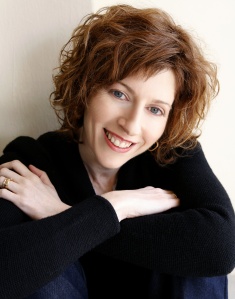As the next of my series featuring fantastic female fantasy authors (see disclaimer) I’ve invited the award winning, multi-talented Alison Goodman to drop by.
Watch out for the give-away question at the end of the interview.
Q: Your first book published was Singing the Dogstar Blues (Great title). It won an Aurealis Award for Best YA novel, was listed as notable book in two other awards and was shortlisted for the Victorian Premier’s Literary Award. This is a time travel, science fiction story, which must have been a lot of fun to write. Are you tempted to go back into the Dogstar world and write more books with this premise?
I’ve already been back! I wrote a follow up short story called “The Real Thing” for Firebirds Rising, an anthology of original Science Fiction and Fantasy. I’ve always had the idea of returning to the Dogstar world at some point, so I wrote the short story as a kind of bridge between the first book, and what may, one day, become the second book in a series.
Q: Your latest book Eona will be released in April 2011. (A sample chapter is provided on this page). Looking at the covers on your website, they are all brilliant. You must be over the moon! (I think I have serious cover envy, here). This new series is written for the adult market. Did you find writing for adults gave you more freedom?
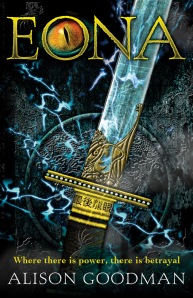 Yes, I’ve been incredibly lucky with my covers and had some great artists working on them.
Yes, I’ve been incredibly lucky with my covers and had some great artists working on them.
EON has been published around the world as both adult fiction and young adult fiction (YA) without a word of the novel being changed, so it is dead square in what is called the “crossover” market. I specifically wrote EON to be a crossover novel, and with that came decisions about how I explored some of the hot-points like sexuality and violence. I suppose my rule of thumb is to always write what is necessary for the story and then see if anyone yells foul! Then make decisions from there. I have pushed the sexuality and violence envelopes more in EONA, the sequel, because the storyline is about power and its abuse, and about awakening sexuality. However, as I wrote both novels, I was always aware that I have some younger readers and so strived to layer the novels so that if a reader does not have the world experience to understand some of the more adult themes, then they can read the books as rollicking good adventure stories.
Q: EONA is the sequel to The Two Pearls of Wisdom/EON, (depending on where you live). How do publishers come up with such disparate names?
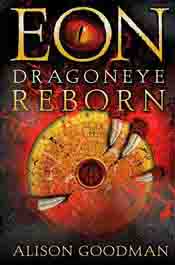 My original titles for the books were EON and EONA. However, my UK and Australian publishers decided to market the book for a mainstream adult market and felt that these two titles were too fantasy genre specific, so they asked me to re-title. I came up with The Two Pearls of Wisdom and The Necklace of the Gods, which I think work well as titles for the novels, but confused some readers as they thought these were other books in the EON/EONA series. Now only my UK adult fiction publisher is going to release the sequel as The Necklace of the Gods. My Australian publishers have decided to return to the EON and EONA pairing, and recently re-released The Two Pearls of Wisdom as EON. Phew! No wonder some of my fans are a bit confused.
My original titles for the books were EON and EONA. However, my UK and Australian publishers decided to market the book for a mainstream adult market and felt that these two titles were too fantasy genre specific, so they asked me to re-title. I came up with The Two Pearls of Wisdom and The Necklace of the Gods, which I think work well as titles for the novels, but confused some readers as they thought these were other books in the EON/EONA series. Now only my UK adult fiction publisher is going to release the sequel as The Necklace of the Gods. My Australian publishers have decided to return to the EON and EONA pairing, and recently re-released The Two Pearls of Wisdom as EON. Phew! No wonder some of my fans are a bit confused.
Q: About book one you say: ‘It has won awards, sold into 16 countries, but the clincher is the scene that brings together a young girl masquerading as a boy, a woman dressed as a man, and a eunuch taking a testosterone tea supplement’ Wow, with a scene like that I think I’ll have to rush out and buy a copy. Have you ever been tempted to write satire (as opposed to say, fantasy with a touch of humour)?
Believe it or not, that scene is actually a straight dramatic scene, albeit with a cast of very singular characters!
I’ve never been tempted to write a full-on satirical novel, although there are elements of comedy in my first two books. Singing the Dogstar Blues is a comedy thriller, and I think of Killing the Rabbit as a black comedy. Mind you, it is my own brand of very black comedy that, alas, is a hereditary weirdness passed through my mother’s side. Also, I did once write a spec episode of the TV comedy The Games with the wonderful Bryan Dawe (one half of the John Clarke and Bryan Dawe political satire team). We had a ball writing together and, although the episode was never made, I learned so much about the grammar of television and the rhythms of satire comedy.
Q: You have a page dedicated to research on your web site. You say: ‘Alongside my reading, I also do empirical research to help me fully create my world using vivid sensory detail. That can mean anything from going to a local Tai Chi class, cooking a new Chinese dish, or travelling all the way to Japan to walk through the temples and gardens.’ You really went to Japan and walked through temple gardens. Was this the first time you’d been to Asia? Did it change the way you viewed Japanese culture and/or the way you approached the book?
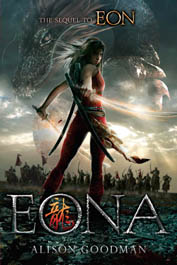 My first contact with Japanese culture came through my Japanese aunt. She married into our family and brought tantalising glimpses of the Japanese culture into my very anglo existence, particularly through her wonderful food and conventions of hospitality. My research trip was the first time I had been in Japan for any length of time and it certainly impacted on my novels in terms of sensory description and the way space is used for living and working.
My first contact with Japanese culture came through my Japanese aunt. She married into our family and brought tantalising glimpses of the Japanese culture into my very anglo existence, particularly through her wonderful food and conventions of hospitality. My research trip was the first time I had been in Japan for any length of time and it certainly impacted on my novels in terms of sensory description and the way space is used for living and working.
Q: Your adult crime/thriller Killing the Rabbit was shortlisted for the Davitt Award. (I note there was a slight SF element in this story). Are your publishers happy with you writing across age groups and genres, or do you they try and shoe-horn you into one genre? Following on from that, will you be writing more crime/thrillers?
So far my publishers haven’t mentioned any problem with me changing genre, probably because three of my four books have been published under a YA banner, which is considered a genre in itself. Also, my crime novel was picked-up by a different publishing house, so there was a separation of my adult crime fiction from my other genre work. My YA publishers would probably prefer that I settle into a genre and stay there, but I’m too restless for that. I go where the story goes, whether it be fantasy, crime, SF or whatever. When I’m developing a story, I like to mash genres together and play with the conventions; see if I can sneak in some surprises that mess around with the structures as well as story and character expectations. I particularly like the thriller form, so yes, I will be returning to it. In fact, my next project is going to be a thriller/urban fantasy duology (you heard it first here!).
Q: You said you returned to the Dogstar world in Firebirds Rising. Are you keen on the short story medium or do you find it difficult to keep within the word limit?
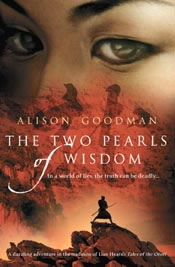 I studied Professional Writing at university and most of my training was in crafting the literary short story, so short is where I started. Writing short fiction is a great discipline – it teaches essential skills such as economy, layering of meaning and careful word choice – and I am always grateful for the excellent foundation I received from my teachers including the great Gerald Murnane. However, now that I have written four novels, I find the short story a bit unsatisfying to write. I enjoy building worlds and complex characters and that is not really the domain of the short story. Having said that, I do still write short stories, they are just quite a bit longer than they used to be.
I studied Professional Writing at university and most of my training was in crafting the literary short story, so short is where I started. Writing short fiction is a great discipline – it teaches essential skills such as economy, layering of meaning and careful word choice – and I am always grateful for the excellent foundation I received from my teachers including the great Gerald Murnane. However, now that I have written four novels, I find the short story a bit unsatisfying to write. I enjoy building worlds and complex characters and that is not really the domain of the short story. Having said that, I do still write short stories, they are just quite a bit longer than they used to be.
Q: I was prompted to start this series of interviews because there seems to be a perception in the US and the UK that fantasy is a bit of a boy’s club. Do you think there’s a difference in the way males and females write fantasy?
My gut says that there are just as many female authors writing fantasy as there are male, and that the perception of it being a boy’s club is bit out of date – perhaps a remnant of when publishing was a boy’s club and it was hard for women to get published in any genre.
As to whether there are differences in the way males and females write fantasy – that’s a toughie. I don’t think I’ve read a big enough cross-section of fantasy novels to make any kind of useful judgment about gender. In the end, though, if a writer is doing their job, the core of a novel should be touching on the universal questions that we all face, regardless of gender.
Q: Following on from that, does the gender of the writer change your expectations when you pick up their book?
 I think my expectations of a book are more centered on the genre rather than the gender of the author. Also, I prefer to read a first person point of view, so when I pick up a book, I am looking for a genre that I like – fantasy, thriller, crime, SF – and the intimacy of that first person point of view.
I think my expectations of a book are more centered on the genre rather than the gender of the author. Also, I prefer to read a first person point of view, so when I pick up a book, I am looking for a genre that I like – fantasy, thriller, crime, SF – and the intimacy of that first person point of view.
Q: And here’s the fun question. If you could book a trip on a time machine, where and when would you go, and why?
A round trip – first I’d like to go back to Shakespeare’s England (with a plague vaccination, if possible) to find out who wrote the plays, and hang out with poet, playwright and spy, Christopher Marlowe. After that, I’d go on to the Regency period in London, with a gender change on the way because the Regency men had all the fun. After a bit of phaeton racing and louche behaviour, I’d journey on to the mid- 1920’s, as a woman again, with a bob and my Charleston dancing shoes. I’d finish up in the early 1960’s in the USA, first to check out the grassy knoll and book depository, and then a quick jump to Woodstock, in flared jeans, a halter-top and a flower in my hair.
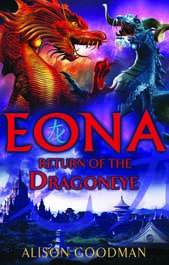 Giveaway question for a signed copy the Australian edition of EONA: If you were a mythical creature, what would you be and why?
Giveaway question for a signed copy the Australian edition of EONA: If you were a mythical creature, what would you be and why?
Alison’s website: www.alisongoodman.com.au
See Alison on a video interview.
Follow Alison on Twitter: alisongoodman

